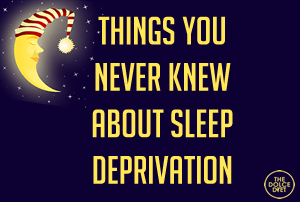Things You Never Knew About Sleep Deprivation
by Samantha Coogan, MS, RDN, LD
When on your way through a weight loss journey or lifestyle change, there are many barriers. But often times, plateaus or set-backs aren’t necessarily caused by your diet and exercise routines, but more due to sleep deprivation. Do you feel like you hit it hard every time you’re at the gym and never fall off the diet wagon, yet you are still seeing a stall in progress? Sleep may be the answer.
The effects of lack of sleep extend beyond just being tired.
Our bodies require 7.5 to 8 hours of sleep per night to fully recover from the day’s activities and stresses. During this time, cells regenerate, your body tissues recuperate, and you literally recharge like a dying cell phone in its battery charger. Our metabolism is also affected while we sleep, and if we deprive ourselves of adequate sleep, our bodies go into “survival mode,” which includes slowing down your metabolism to conserve energy.
When you don’t get enough sleep, your body starts to crave foods, and not the healthy stuff.
It wants fast-acting carbohydrates to elevate blood sugars as fast as possible to satisfy that urge and rid ourselves of fatigue. This ultimately becomes counteractive because it is only a matter of time before we crash, feeling even more tired than before, due to low blood sugar. Fast-acting carbohydrates metabolize so quickly that we get a short-term “high” and then quickly crash out.
Our bodies were created to protect us. Physical protection is the major function of our bones and skin. But we also have a lot of chemical ways to protect ourselves. When we are sleep deprived, our bodies go into “fight or flight” mode. By doing so, your body releases adrenaline and cortisol.
Adrenaline increases your heart rate and blood pressure while giving short bursts of energy. This hormone is usually responsible for personal records in competition due to the euphoric and energy-boosting effect it has on the body. However, cortisol is a stress hormone which tends to store fat (especially in the abs) as a way to protect the body by conserving energy reserves. Too much cortisol production usually leads to excess fat storage.
Now that we have some of the facts, it is crucial to try to commit to 7-8 hours of UNINTERRUPTED sleep per day. Unfortunately, 6 hours of sleep with a 2 hour nap mid-day won’t have the same effect on the body as 7-8 hours of REM sleep.
We all have gotten to that “there just aren’t enough hours in the day” point, but we have to make ourselves a priority in order to be healthy, which will ultimately lead to higher productivity.
If we fail to do this, we will likely have temporary success with a longer-term burnout. Consistency is key. So if it means saving that extra episode on Netflix for the next night, then so be it! Take care of yourself and you will be rewarded daily!





